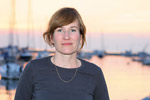“Longing” for Valeska Grisebach’s films
for isolacinema.org by Oana Stopariu
 With her latest film Valeska Grisebach moved further from clichés somehow expected from a young director. A second film that still avoids mainstream entertainment, a judgement already stated about her work and artisitic vision. Longing developed again the ability of thinking and breathing, as the director herself is creating strong images instead of usual kynestezic emotions.
With her latest film Valeska Grisebach moved further from clichés somehow expected from a young director. A second film that still avoids mainstream entertainment, a judgement already stated about her work and artisitic vision. Longing developed again the ability of thinking and breathing, as the director herself is creating strong images instead of usual kynestezic emotions.
How do you create your films?
Sometimes when I start a film or a project I just have maybe atmosphere in my mind, a subject that is interesting to me. There was this strange world longing and because it’s something that goes with you the whole life, tells a lot about you and your desires and in the same time it’s always a bit bitter-sweet. Because you can’t have everything. In my latest film there are these young people at the beginning of their life expecting everything, but the stage for longing or desires are very often love-stories, so suddenly out of a very ordinary life a love-story can make somebody a very melodramatic person or hero. So I thought I should write a love-story. I was searching for a dramatic moment for the story and I remembered the story from when I was in France, four years ago. I was living in a little village and on the main street and in front of mine there was another house where a couple was living. I would see them sometimes walk and at some point I was told that he had a wife and he made a trip because he had to work in a different city and he fell in love with another woman, he had a love-affaire and his wife left him. But he was so unhappy that he shot himself in the heart, but he survived. This was so interesting to me, in a village where nobody is showing their feelings and everybody was so closed, that this man drove himself in such a romantic way. He became a romantic hero and his scarf was like a sign… This was the moment when I started to write.
How are you joggling with improvisation and pre-direction?
Sometimes at the beginning it’s very abstract and I would like to tell a story about a feeling and I start to a make a story, I start to write subtextes and at some point when I make a film, I like to have always some parts open. There is a story written and then some scenes take a long time to prepare and sometimes for others I just say when we’re shooting, I’ll see how I’ll make it. So, some dialogues can change. It’s so interesting because I think a lot before we’re shooting and then finally we’ll have to catch everything it’s possible at some moment with those people. I’m shooting bit by bit and I’m not improvising while I’m shooting. When we prepare we do a bit of improvisation, but not when we’re shooting. It’s possible to be open when you have a strong basement.
Do you already have a habit of working with non-professional actors?
For me everything is possible and I mean with every new film, I start again something new and everything can be different. And every story has it’s own wishes for making a film. This film was very interesting because I’ve made documentaries before. Also, in Germany it’s such a strong separation and I can’t understand this and I can’t separate this, especially when films offer such a space for mixtures of people who suddenly have something special in front of the camera. There is always a subject about non-professional actors, professional actors. For me it was kind of interesting to make a story with non-professional actors, faces that you don’t see normally in German cinema.

